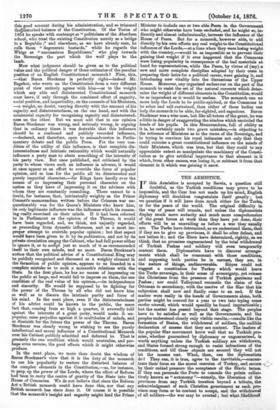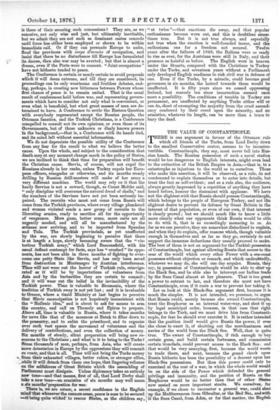THE ARMISTICE.
IF this Armistice is accepted by Servia, a question still doubtful, as the Turkish conditions may prove to be impossible, and the Czar has not made up his mind, English diplomacy will doubtless congratulate itself greatly ; but we question if it will have done much either for the Turks, or for the peace of the world. The original difficulty in the way of peace will remain, and unless the diplomatists display much more audacity and much more comprehension of the great forces at work than they have yet done, their efforts will be as unavailing as before a war they usually are. The Turks have determined, as we understand them, that if they are to give up provinces, it shall be after defeat, and not before it ; and the Slays have determined, rightly, as we think, that no promises unguaranteed by the total withdrawal of Turkish Pashas and soldiery will even temporarily content them. Diplomatists have to discover arrange- ments which shall be consonant with those conditions, and supposing both parties be in earnest, they are, in the nature of things, undiscoverable. Sieyes could not suggest a constitution for Turkey which would leave the Turks sovereign, in their sense of sovereignty, yet release the Christians from the presence of Turkish garrisons and Pashas ; nor could Talleyrand reconcile the claim of the Ottoman to ascendancy, with the resolve of the Slav that his subjection shall now and finally come to an end. If the matter were really in the hands of Governments alone, both parties might be coerced for a year or two into trying some modus viventli, which would speedily be found impracticable ; but the matter has passed beyond that stage. The peoples have to be satisfied as well as the Governments, and the peoples understand clearly only visible results,—results like the formation of States, the withdrawal of soldiers, the audible declaration of masses that they are content. The leaders of the popular Slav movement know well that no Turkish pro- mise, whether guaranteed by diplomacy or unguaranteed, is worth anything unless the Turkish soldiery are withdrawn, and States formed strong enough to resist infractions of the conditions, and till these objects are secured they will not let the masses rest. What, then, can the diplomatists do ? They can, it is true, agree to the inevitable,—concen- trate their force on the moral coercion of Turkey, and secure by their united pressure the acceptance of the Slavic terms. If they can persuade the Porte to concede the points collec- tively known as "autonomy "—namely, the liberation of the provinces from any Turkish taxation beyond a tribute, the acknowledgment of such Christian govornment as each pro- vince may form or be content to accept, and the withdrawal of all soldiers—the war may be averted ; but what likelihood is there of their securing such concessions? They are, as we conceive not only wise and just, but ultimately inevitable, but we conceive, they are not such as dominant castes concede until force has either been employed or shown to be within immediate call. Or if they can persuade Europe to unite, flood the provinces with corps d'arrne'es of occupation, and insist that there be no disturbance till Europe has formulated its decree, then also war may be averted ; but that is almost a dream, even if the Porte were to consent. "Joint occupations" have not hitherto tended to peace.
The Conference is certain or nearly certain to avoid proposals which it will deem extreme, and till they are considered, its proceedings can be only wearisome and fruitless debates, end- ing, perhaps, in creating new bitterness between Powers whose fInt chance of peace is to remain united. That is the usual result of conferences held before war, and representing govern- ments which have to consider not only what is convenient, or even what is beneficial, but what great masses of men are de- termined to have. A Conference to settle the Eastern Question with everybody represented except the Russian people, the Ottoman fanatics, and the Turkish Christians, is a Conference compelled to consult not its own opinions, or even those of its Governments, but of those unknown or dimly known powers in the background,—that is, a Conference with its hands tied, and its. mind left without essential information.
We do not depreciate the possible utility of the Conference from any fear for the result to what we believe the better cause. Upon the whole, and subject to the consideration that death may at any moment change much in the policy of States, we are inclined to think that time for preparation will benefit the Christian cause. Servia, of course, will not expel the Russians already in her ranks, unless Turkey expels her Euro- pean officers, renegades or otherwise, and six months steady drilling by Russian drill-masters will make of her army a very different machine. The world may rely on it that the hardy Servian is not a coward; though, as Count Moltke said, "only discipline will overcome the natural dread of shells," and the numbers of the Servians have not yet been seriously im- paired. The recruits who must not come from Russia will come from the Pinkish provinces, where every village plundered and woman violated sends a new group of recruits to the liberating armies, ready to sacrifiee all for the opportunity of vengeance. More gum better arms; more carts are all urgently needed; and will all be manufactured by the artisans now arriving, and to be imported from Spandau and Tula. The Turkish provincials, as yet unaffected by the war, are slowly beginning to perceive that there is at length a hope, slowly becoming aware that the "vic- torious Turkish army,' which Lord Beaconsfield, with his usual defiant contempt for facts, says has " crushed " its oppo- nents, has not been able in- three months of fighting to over- come one petty State like Servia, and has only been saved from destruction in Montenegro by Austrian interference. Time will not wear out the horror of Turkish' rule, reinvigo- rated' as it will be by importations of volunteers from Asia and by the barbarities they are certain to commit; and it will wear out the belief in the invincibility of the Turkish power. Time is valuable to Rowmania, where the tradition of Turkish sway is not. yet ' lost and it is invaluable to-Greece, where a timid Ministry at last begins to perceive that Slavic emancipation is not hopelessly inconsistent with the "Hellenic idea,' and is about to ask for means to arm the country, and calr on Thessaly and Epirus to prepare. Above all, time is valuable in Russia, where it takes months for news like that of the massacre at Batak to filter down to the peasantry, and to enlist the priesthood, and to organise over such vast spaces the movement of volunteers and the delivery of contributions, and even the collection of money. Six months of steady, silent preparation will bring new re- sources to the Christians ; and what is it to bring to the Turks ? Some thousands of men, perhaps, from Asia, who will create more detestation in Europe by the oppressions they will commit en route, anti that is all. Time will not bring the Turks money 6. from their exhausted villages, better rulers, or stronger allies, ,vhile it will detach from them one hope, that lingering reliance on the selfishness of Great Britain which the assembling of Parliament must dissipate. Unless diplomacy takes an entirely new tone—and that means, first of all, that Lord" Derby shall take a new tone—an armistice of six months may well mean, a six months' preparation for war: There is, we are aware, a secret confidence in the English mind that whenever the cannon cease, peace is sure to be secured: —it being quite wicked to rescue States, as the children say, "at twice "—that emotions die away, and that popular enthusiasms become worn out, and this is doubtless some- times true. But it is not true always, and especially not true when the emotion is well-founded terror, and the enthusiasm one for a freedom not secured. Twelve years after the failures of 1848, the Italians were as ready to rise as ever, for the Austrians were still in Italy, and their presence as hateful as before. The English were in heaven under the Stuarts, compared with the Christians in Turkey under the Turks, and seventeen years without a Parliament only developed English readiness to risk civil war in defence of one. Even if the Turks, by a miracle, could become good governors in six months, the hatred towards them would be unaffected. It is fifty years since we ceased oppressing Ireland, but scarcely ten since insurrection seemed once more a possibility. The conditions of trouble in Turkey are permanent, are unaffected by anything Turks either will or can do, short of exempting the majority from the creel ascend= ancy conferred by their creed upon the minority, and no armistice, whatever its length, can be more than a truce to bury the dead.



































 Previous page
Previous page